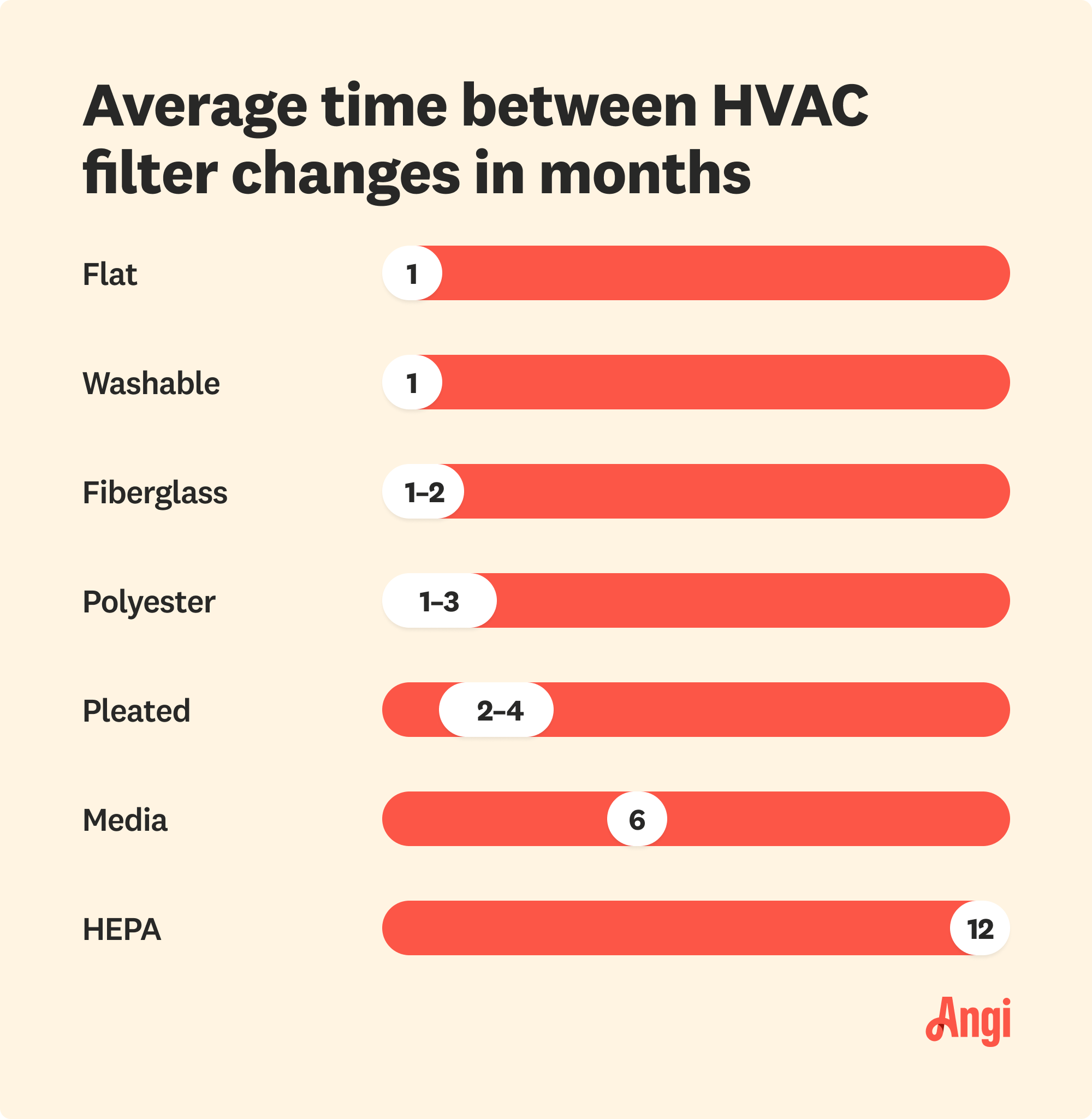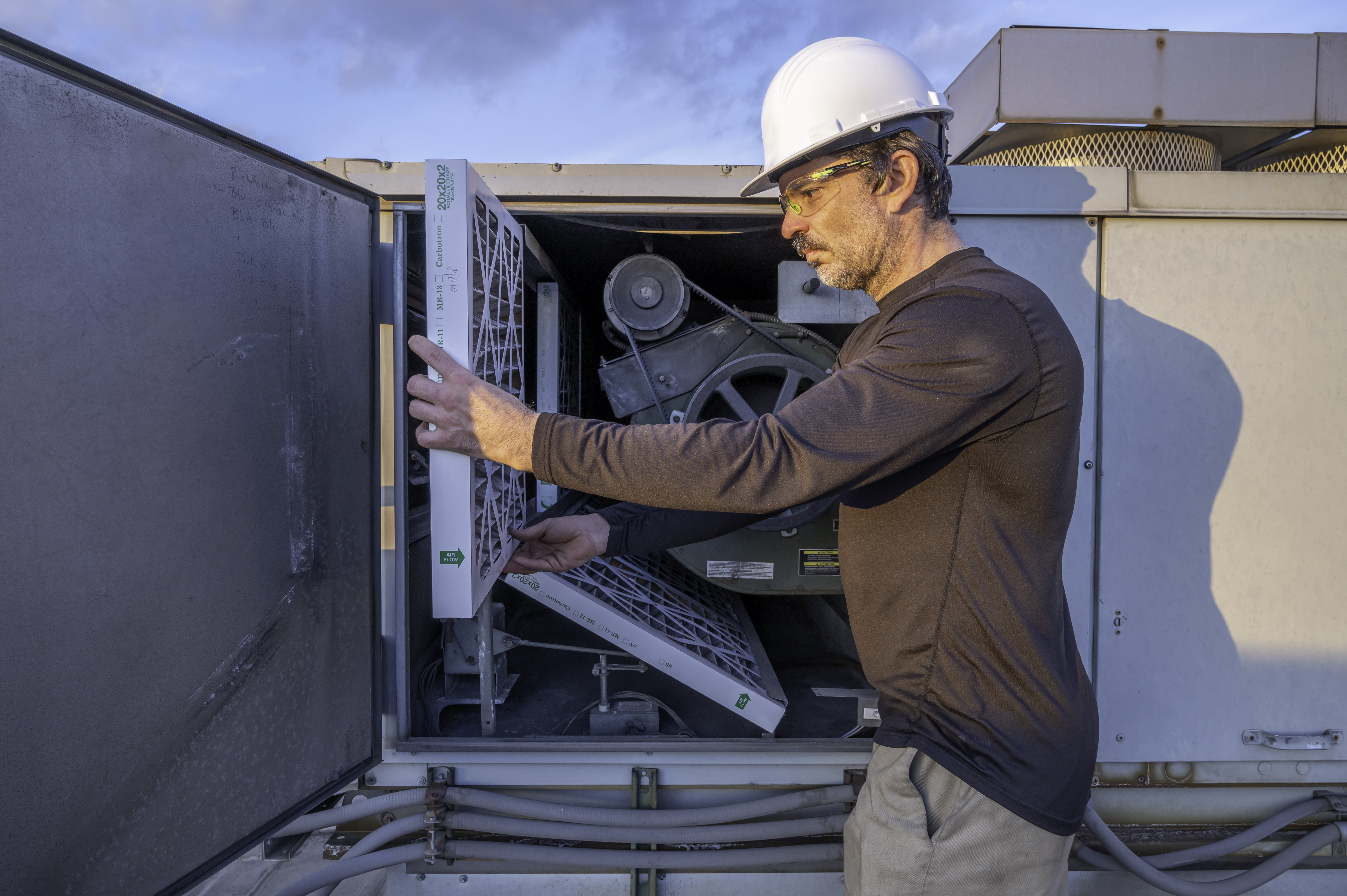
Average costs of HVAC inspections vary based on house size, location, and type of HVAC system. Follow our easy guide to gauge your home’s HVAC inspection cost.
Don’t lose your cool—use these tips to get your AC back up and running


A circuit breaker trip following a power outage is a common reason AC units stop working.
Replace your thermostat’s batteries and double-check its settings to ensure the AC issue isn’t actually a thermostat issue.
Cleaning or replacing your AC filter is a quick, easy task that could bring your AC back up to speed.
If you suspect a refrigerant leak, call a pro ASAP and don’t try to fix the issue on your own.
Air conditioning units have a peculiar way of breaking down on the hottest days of summer, right when you need them most. Don’t overheat looking for a solution. While your entire AC system may seem complex, the answer to your troubles could be very simple. Here are some common reasons why your AC stopped working and how to get back to relaxing in that cool, comfortable air.
First and foremost, for your AC to run, your home needs active electrical power. It may seem obvious, but on a hot summer’s day, you will quickly notice the temperature in your home start to creep up before realizing other electronics are also off.
If your entire house has lost power, report the outage to your local utility company. But if certain appliances and electronics are still working, the breaker for your AC unit may have tripped.
Check the breaker box. If you spot a tripped breaker, reset it to get your AC working again. Keep in mind that breakers always trip for a reason. If the issue persists, the circuit may be overloaded or there is another issue that should be diagnosed and fixed by a local AC repair specialist.
For your AC to work properly, you’ll need a functioning thermostat. This handy-dandy device senses the temperature in your home and adjusts the AC accordingly based on your inputs. If it’s broken or shut off, your AC won’t run.
To check whether your thermostat is working, start by making sure it’s switched on. If the screen won’t light up, swap out the batteries—easy enough. Note: Smart thermostats do not require batteries because they receive power directly through wiring.
If your thermostat still won’t turn on after replacing the batteries, it could be due to a blown fuse inside the panel. Hire an HVAC professional to test your thermostat with a multimeter and make the necessary repair.

The presence of water, dust, dirt, or grime can cause your AC unit to work inefficiently and potentially stop functioning altogether. Make sure you keep up with regular AC maintenance to avoid any unnecessary service interruptions.
We recommend calling a pro for AC servicing and preventative maintenance at least once per year. The ideal season for service is in the spring before you really need to use and depend on your AC in the summer.
If you haven’t replaced your AC filter in a few months (or longer), now is the time to do it. You should change your HVAC filters roughly every three months (and more often if you have pets, smoke indoors, or have allergies). If this task is neglected for long enough, the filter will become clogged and restrict the airflow throughout your AC system.
However, if you have a fresh filter and the air coming out of your AC is not cooled to your liking, the coils might be dirty and unable to efficiently remove heat from your home. You can clean AC coils yourself or schedule an AC tuneup if you’d rather have a professional do it for you.
A disconnect switch, or safety switch, is different from a typical on-off power button. A disconnect switch completely shuts off the electrical circuit to your AC so a technician can safely work on the unit. Sometimes, this switch can be bumped into and accidentally turned off.
You will likely find a disconnect switch on both your indoor and outdoor AC unit. Make sure both switches are in the “on” position so electricity can reach and power your cooling unit.
Your AC unit is smarter than you think. Most systems have built-in safety features that prevent common situations that could lead to damage or harm from occurring. Here are a couple of examples.
AC units collect a lot of water, or condensate, from the air it cools and disposes of it through a drain pipe. If the drain pipe becomes clogged, water will build up in a drip pan beneath your unit. To prevent the water from overflowing the pan and potentially damaging your home, the condensate overflow switch will shut off your unit.
Similarly, a drain pan safety switch aims to prevent water leakage from your AC. If the pan beneath your unit isn’t in the correct position to collect overflowing water, your AC will shut off until the pan is manually adjusted.
Condensate overflow switches, drain pan safety switches, and other AC safety features exist for a reason. If you’re experiencing an issue with one of them, call a pro. Trying to fix these switches yourself could damage them, potentially leading to leaks, flooding, and other problems.
There are hundreds of components that make up the inner workings of your air conditioning unit. With regular use and age, eventually these components will wear down or break and require replacing. If you have already gone through the above scenarios without any luck, there is a good chance your AC went out due to an internal problem.
Electrical issues can vary from blown transformers to faulty capacitors to loose wiring. In any case, if you think your AC unit could have an electrical issue, always consult a qualified electrician or HVAC repair person to diagnose and fix the problem.
If your air conditioner suddenly stops working, it could be due to low refrigerant levels. Refrigerant is essential for the cooling process, and a leak or insufficient levels can stop the AC from working properly or at all.
Handling this situation is not a DIY job. It requires specialized knowledge, equipment, and certification since refrigerant is hazardous to both human health and the environment.
To safely address this issue and ensure optimal performance, enlist the expertise of a qualified HVAC professional. They can identify and fix refrigerant leaks, recharge refrigerant levels, and ensure your system's efficiency while prioritizing safety.
Explore some quick tips to keep your AC in tip-top shape, keeping you cool as a cucumber.
Regularly clean or replace air filters to ensure proper airflow and efficiency.
Keep the outdoor unit clear of leaves, branches, and other debris for optimal airflow.
Schedule annual professional maintenance to inspect and tune up your AC system.
Check and clean the evaporator and condenser coils to prevent dirt buildup.
Ensure proper insulation around refrigerant lines to prevent energy loss.
Monitor thermostat settings to avoid unnecessary strain on the system.
Seal any leaks in the ductwork to prevent air loss.
Avoid blocking vents with furniture or other obstructions.
Consider installing a smart thermostat to optimize energy usage.
From average costs to expert advice, get all the answers you need to get your job done.

Average costs of HVAC inspections vary based on house size, location, and type of HVAC system. Follow our easy guide to gauge your home’s HVAC inspection cost.

Inspections are an essential part of furnace maintenance. Prevent inconvenient breakdowns by budgeting for furnace inspection costs and repairs.

Find out the average humidifier repair cost, what impacts pricing, and how to save. Get expert tips to budget for your humidifier repair.

Ductwork losing energy? Here are six duct sealing methods that will help you get some big savings on your monthly energy bills.

Wondering who to hire for swamp cooler installation? Learn when to call an HVAC contractor, electrician, or handyperson, and what to expect.

Not sure who to hire to install radiant floor heating? Learn which pros handle radiant floor heating installation and how the work comes together.